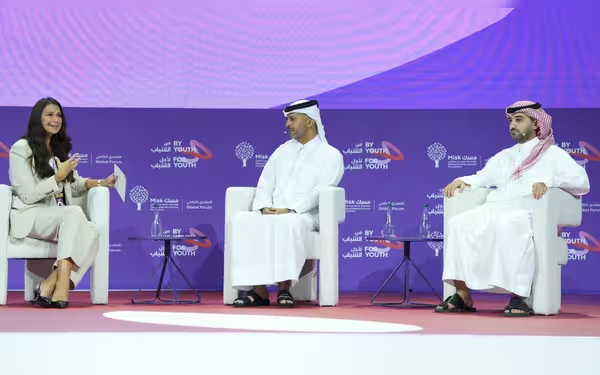Monday, December 23, 2024 11:33 PM
Saudi Arabia's 2034 World Cup Bid: Lessons from Qatar
- Fan engagement is crucial for a successful tournament.
- Saudi youth can drive growth and transformation.
- Addressing challenges is essential for hosting success.
 Image Credits: arabnewspk
Image Credits: arabnewspkSaudi Arabia aims to learn from Qatar's World Cup experience to enhance its 2034 tournament bid.
As Saudi Arabia prepares to bid for the 2034 FIFA World Cup, valuable lessons can be drawn from Qatar's experience in hosting the 2022 tournament. Nasser Al-Khater, the CEO of FIFA World Cup Qatar 2022, recently shared insights during a discussion at the 2024 Misk Global Forum in Riyadh. He highlighted both the challenges and opportunities that Qatar faced while organizing one of the largest sporting events in the world.
Al-Khater described the 2022 World Cup as "the best-ever World Cup in the history of the tournament," noting that it attracted 3.2 million ticket sales, a 17 percent increase compared to the 2018 World Cup in Russia. He emphasized that the event was the most sustainable tournament to date, showcasing how football authorities worldwide can learn from Qatar's approach to hosting major events.
One of the key takeaways from Qatar's experience is the importance of placing fans at the center of the event. Al-Khater stated, "You saw a World Cup that put the fan at the very center … that created an experience for fans that were able to engage with the tournament beyond the 90 minutes." This focus on fan engagement is crucial for Saudi Arabia as it seeks to create a memorable experience for attendees in 2034.
However, hosting the World Cup was not without its challenges. Al-Khater pointed out significant hurdles, including the global COVID-19 pandemic, logistical issues related to rapid infrastructural development, and concerns about worker welfare. He also mentioned the intense media scrutiny that Qatar faced, which often painted a negative picture of the country. "From the bid stage, the challenge was people not taking us seriously," he explained, highlighting the need for Saudi Arabia to prepare for similar challenges.
Albalawi, the head of the Saudi Arabian Sports Federation’s Bid Unit for the 2034 World Cup, reflected on the youth of Saudi Arabia, noting that while the average age of competing bid teams was in the 50s and 60s, the Saudi team was much younger, averaging between 31 and 32 years. He acknowledged the initial concerns about experience but quickly recognized the potential of Saudi youth, stating, "The Saudi youth is one of the most capable youths of the world." This optimism is essential as the Kingdom aims to leverage its youthful demographic to create a successful World Cup.
Albalawi expressed confidence in Saudi Arabia's bid, stating, "Very confident. Saudi Arabia is a story of growth … of remarkable transformation." This sentiment reflects a broader vision for the Kingdom, aligning with its Vision 2030 plan for national development and diversification. The World Cup is seen not just as a sporting event but as a strategic project that can drive growth and unity within the nation.
Moreover, Al-Khater emphasized the impact of the World Cup on youth, noting that it instilled a sense of national pride and teamwork. He mentioned the importance of including young people in the planning process, which can serve as a developmental tool for the nation. Albalawi encouraged Saudi youth to embrace the opportunity, urging them to strive for excellence in their respective fields, whether in engineering, health, or sports administration.
As Saudi Arabia sets its sights on hosting the 2034 World Cup, it is crucial to learn from Qatar's experiences. By focusing on fan engagement, addressing challenges head-on, and harnessing the potential of its youth, Saudi Arabia can create a World Cup that not only showcases its capabilities but also fosters national pride and unity. The journey ahead is filled with opportunities, and with the right approach, the Kingdom can indeed write a remarkable chapter in the history of global sports.













